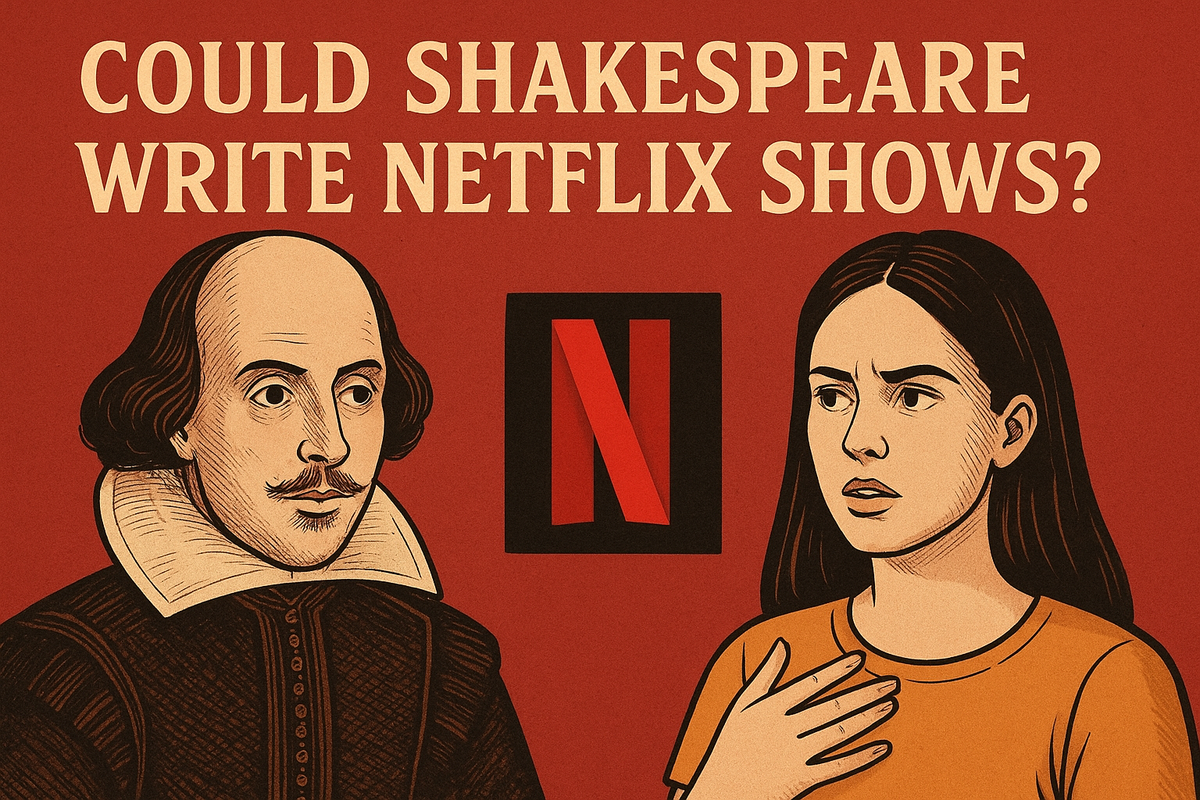Could Shakespeare Write Netflix Shows?

Streaming platforms like Netflix have redefined global entertainment. From gritty dramas like Narcos to reality sensations such as Love is Blind, today’s shows captivate audiences with binge-worthy storytelling. But here’s a thought experiment: what if William Shakespeare, the Bard of Avon, was writing in the streaming age? Could his mastery of iambic pentameter, timeless themes, and sharp wit translate into hit Netflix originals? Let’s dive into this quirky analysis, blending humor, cultural commentary, and a touch of literary speculation.
Shakespeare’s Storytelling vs. Netflix’s Formula
Shakespeare thrived on universal human themes—love, betrayal, ambition, revenge, and the chaos of power. Netflix shows thrive on similar principles. House of Cards echoes Macbeth’s ambition and moral corruption. Stranger Things borrows from Shakespearean tropes of friendship, fate, and supernatural forces.
But Netflix also demands brevity and hooks: cliffhangers that make you hit “Next Episode.” Shakespeare’s plays—rich in soliloquies—would face editing pressure from modern showrunners. Imagine executives telling him:
“Bill, love the monologue, but can Hamlet wrap it up in 20 seconds? The algorithm shows viewers are skipping.”
Shakespeare’s genius was in weaving complexity, but would the algorithm allow Hamlet’s Act III to survive untouched?
What Genres Would Shakespeare Dominate on Netflix?
1. Political Dramas
Shakespeare’s knack for palace intrigue is perfect for political thrillers. Julius Caesar could be remade as a Netflix limited series about backstabbing senators in modern Washington or London. Richard III practically screams Netflix Original.
2. Teen Dramas
Romeo and Juliet’s star-crossed romance has already inspired Riverdale-style adaptations. Shakespeare would thrive in the teen genre, sprinkling poetry over high-school scandals, dances, and forbidden love. Imagine Euphoria, but narrated in rhyming couplets.
3. Reality TV
Now for the fun part: could Shakespeare write reality TV?
- Love is Blind: A sonnet about falling in love without seeing your partner.
- The Bachelor: A reimagining of A Midsummer Night’s Dream, where Puck controls who gets the rose.
- Survivor: Shakespeare channels The Tempest, with alliances as fragile as shipwrecked friendships.
Would audiences stand for characters speaking in verse during confessional interviews? Probably. After all, reality TV already thrives on melodrama and exaggerated language.
Iambic Pentameter in a Binge-Watching World
Iambic pentameter—the “da-DUM da-DUM da-DUM da-DUM da-DUM” rhythm—was Shakespeare’s signature. Imagine a reality contestant saying:
“I did not come to scheme, yet scheme I must.”
It might sound oddly natural in dramatic Netflix moments. Think of The Crown, where measured dialogue already carries Shakespearean weight. On the flip side, hearing characters in Tiger King describe exotic cats in pentameter might strain even the Bard’s creativity.
Shakespeare as a Netflix Showrunner
Shakespeare wasn’t just a writer; he was a savvy producer, running the Globe Theatre as both business and art. In the Netflix era, he’d probably embrace data analytics, social media, and global storytelling. His “quill” would be a MacBook Pro, his sonnets rebranded as teaser trailers.
But would Shakespeare compromise his vision to meet Netflix’s algorithms? He might release two versions of each show:
- The Original Cut: Faithful to his long speeches.
- The Algorithm Cut: Tightened for binge culture.
This dual-release strategy mirrors directors today fighting for “director’s cuts” on streaming platforms.
Could Shakespeare Handle Global Audiences?
Netflix serves over 190 countries. Shakespeare’s plays have already been translated worldwide for centuries. His themes of jealousy (Othello), ambition (Macbeth), and love (Romeo and Juliet) cross borders effortlessly.
However, cultural sensitivities in today’s world might challenge some of his more controversial themes. Could he write Taming of the Shrew for 2025 audiences without a major rewrite? Probably not. But then again, adaptation has always been Shakespeare’s strength.
Modern Shakespeare-Inspired Shows
In many ways, Shakespeare already is on Netflix—indirectly:
- Sons of Anarchy (inspired by Hamlet).
- Westworld (borrowing existential themes of free will).
- The Lion King (a Disney classic rooted in Hamlet).
- She’s the Man (Twelfth Night modernized).
Streaming has continued this lineage. It’s not far-fetched to imagine a Netflix “Shakespeare Universe,” just as Marvel created its cinematic empire.
A Hypothetical Line-Up of Shakespeare’s Netflix Originals
- “Crown & Dagger” – A political thriller based on Macbeth, set in a futuristic dystopia.
- “Verona High” – A teen drama reboot of Romeo and Juliet. Think Elite, but in verse.
- “Tempest Island” – A survival reality show where contestants must form alliances on a mysterious island, overseen by a mischievous host named Puck.
- “Much Ado in the City” – A rom-com mini-series where witty banter replaces awkward texting.
Would these shows go viral? Probably. Would critics hail them as “prestige Shakespeare for the streaming age”? Definitely.
Shakespeare and the Stream
So, could Shakespeare write Netflix shows? The answer is a resounding yes—but with caveats. His mastery of language and storytelling would shine, but he’d wrestle with binge-culture attention spans and algorithm-driven demands. Reality TV in pentameter might be a stretch, but political dramas and teen sagas would thrive under his quill.
Ultimately, Shakespeare’s genius lies in adaptability. Just as his plays transitioned from candlelit theaters to Hollywood films, they could just as easily stream in 4K on your living room screen. In the age of autoplay and binge culture, the Bard would not just survive—he’d trend.
References & Further Reading
- British Library | Shakespeare’s influence
- Folger Shakespeare Library
- Netflix Global Audience Stats
- The Guardian | Shakespeare in modern culture
.




